Hikaru Nakamura and Magnus Carlsen are through to the Magnus Carlsen Invitational final after winning incredibly tense battles against Fabiano Caruana and Ding Liren respectively. On Sunday the event ends with a $115,000 final ($70,000 for the winner, $45,000 for the runner-up), where Magnus takes on perhaps his greatest historic rival in speed chess.
Hikaru Nakamura – Fabiano Caruana: 4-2
The day started slowly but suddenly became epic in the 4th game when Fabiano managed to win on demand to force playoffs. Hikaru was distraught and admitted, “everything was starting to spiral out of control”, but a blunder by Caruana in the first blitz game was the boost he needed.
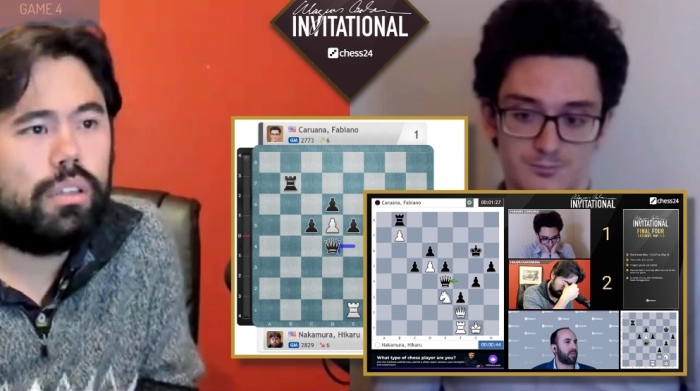
It was no surprise that the first games were cautiously played. Hikaru Nakamura later said that he’s used to being tested with the black pieces against Fabiano Caruana, but not today: “it felt to me that in this match he wasn’t putting pressure on me with White, and because of that I felt much more comfortable than I usually do against him”.
In the first game, Fabiano got nothing with White, and in fact, it was Hikaru who could dream of more before the game fizzled out into a draw. The second game was also quiet, but the commentators felt that Nakamura got an almost dream version of the Exchange Slav.
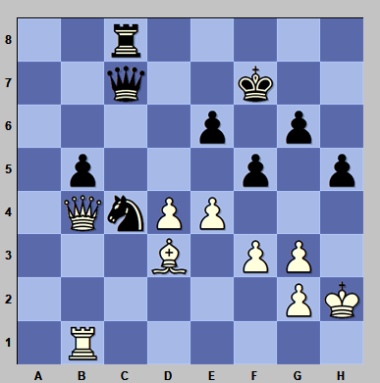
It was all about the weak b5-pawn until Hikaru finally grabbed it with 51.Qxb5?, seemingly overlooking the simple fork. He managed to gather himself again and after 51…Na3 52.Qb3 Nxb1 it turned out that the zwischenzug 53.exf5! (53.Qxb1? h4! and Black wins) gave him just enough counterplay against the black king to go on to force a draw by perpetual check.
The third game was another Giuoco Piano, but it ended up being anything but quiet. Magnus later explained that although computers always give White some kind of edge, “these are the kinds of position which aren’t easy to play for White”.
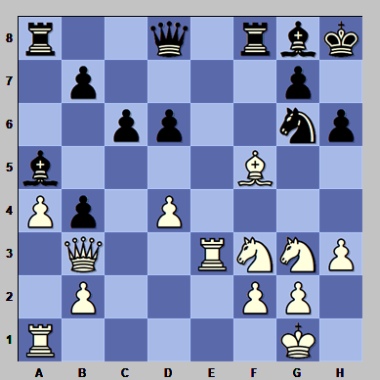
If Fabiano had played 26.Be6 we might have got a quick draw by repetition. He preferred a much more ambitious continuation 26.Qc2 but after 26…Nh4! (the move Nakamura assumed his opponent missed) Black was suddenly much better, and in a few moves, White was dead lost. “It’s inexplicable… he just didn’t sense the moment,” Magnus commented, as Fabiano found himself a point down before having the black pieces in the 4th game.
The fourth rapid game, a must-win encounter for Caruana, turned into an epic. Peter Svidler described it as “unbelievably tense” and Magnus Carlsen ultimately summed up, “that was amazing!” Fabiano Caruana played a version of the King’s Indian that was a feared weapon of choice for the young Nakamura, and the position he got was the kind Hikaru used to relish.
Black began to punch holes in the white position, though it was too close to call until Caruana finally began to demolish the white kingside:
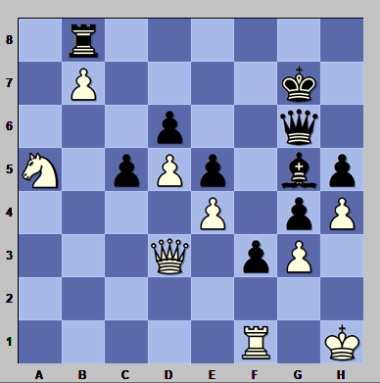
48…Bxh4! 49.gxh4 was the brutal force required, but what really impressed were the “quiet” follow-up moves: 49…Qf6! 50.Kg1 Qxh4 51.Qd2 Kg6! and soon things were falling apart for Nakamura.
That meant that for the first time in the Magnus Carlsen Invitational we were going to blitz playoffs since up to two pairs of 5+3 blitz games would be played before Armageddon. The players had little time to cool down, and Hikaru admitted he hadn’t got his nerves under control. He nevertheless seized control again with Black, but he lamented that 33…d4? 34.Bd2! (the move he’d missed) spoilt his position. The climax of the whole match came twelve moves down the road when Fabiano was down to under 30 seconds on his clock. The commentators and Hikaru spotted the option of 46.Nf6+, which Hikaru thought was simply winning. In fact after 46…Nxf6 47.Rh8+ Kxh8 48.Qxg6 there’s no need whatsoever to resign. Instead, Fabiano played 46.Rc8, a move that may objectively be stronger, but it seems he missed the point of 46…Nf8:
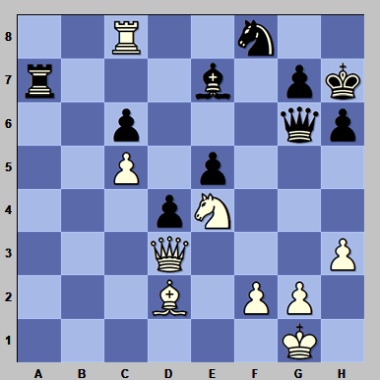
47.Rxc6?? was just a blunder, since after 47…Qxc6 there’s no mate with 48.Nf6+ because the f8-knight is covering the h7-square. Fabi played 48.Ng5+ but resigned shortly afterward.
That meant Caruana needed to win on demand again with the black pieces, and at some point, it looked as though he might. “Even though it’s fine objectively… it’s just so stupid”, said Hikaru of his 16.Bc6!?, but although the game was tense Fabiano never really got any control, and when he tried to force something in a drawn ending it led only to defeat. The world no. 2 summed up afterward in his Twitter: “Tough final (for me) match. Almost mounted a comeback but couldn’t recover from that awful blunder in game 5. Still, it was a thoroughly enjoyable event. Congrats to Hikaru and good luck in the final.”
Magnus Carlsen – Ding Liren: 2½ – 1/½
The World Champion blundered horribly in Game 2 and was in huge trouble in Game 3 until Ding returned the favor by stumbling into checkmate. Both players rejected chances to draw in Game 4 before Magnus emerged victorious, later commenting, “I haven’t felt this kind of tension in a long while – this was real!”
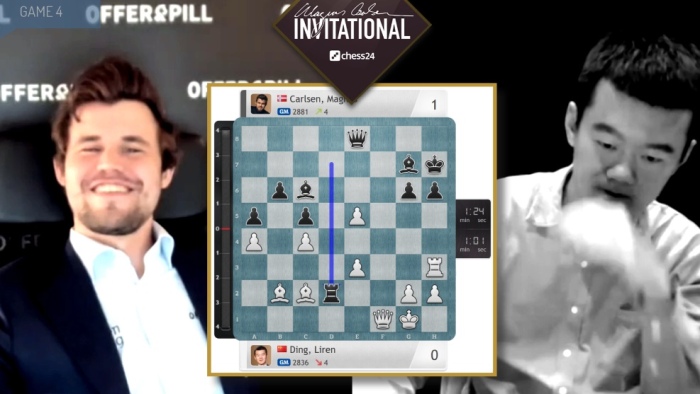
It had seemed as though the drama of the Caruana – Nakamura semi-final the day before would be impossible to beat, but in the end, Ding Liren-Carlsen was every bit as exciting.
Both matches got off to quiet starts, and there were none of the outrageous opening choices we’d seen Magnus make when he played Ding in the largely meaningless last round of the preliminary stage. “You see how seriously Magnus is playing when it’s a real match,” commented Alexander Grischuk.
In the first game Magnus had White and built up a powerful looking attack on the kingside, but Ding Liren held with an extremely accurate defense until they reached a position where there was no way to break through.
Magnus had carefully equalized with Black in Game 2 and was hunting for more, when after 31.Qd3 he sank into thought:
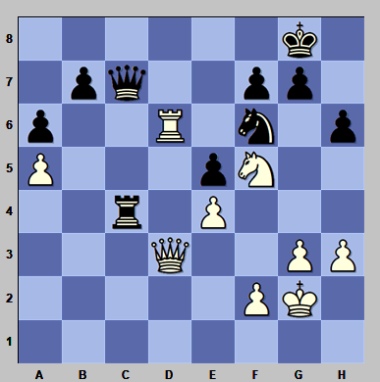
Black has just picked up an extra pawn, but the position is dynamically balanced, with lots of options. 31…Rd4 was a move our commentators pointed out almost draws on the spot, while other possibilities include 31…Rc3 or 31…Rc1 – even 31…Nxe4 doesn’t lose. Instead, after nearly 5 minutes, Magnus played 31…Kh7?? and still hadn’t spotted what he’d done when Ding Liren replied 32.Rxf6!. It was only after 32…gxf6 33.Qe3 that the World Champion realized to his horror that he’d fallen for one of the most notorious checkmating patterns in chess – there’s no stopping Qh6-g7#
That meant the World Champion had two games to try and mount a comeback, but at first, it looked as though the match was going to be over in just three games. Ding Liren was ready for Carlsen’s London System and by move 6 had created a new position on the board. Magnus thought for over a minute before 7.c3!?
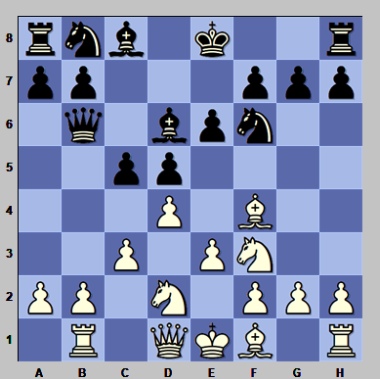
That ran into 7…cxd4! 8.cxd4!? Bxf4 9.exf4 Nc6 10.Nb3 and White’s setup looked anything but sound – 10…a5 upped the pressure, and Magnus had no faith in his position: “I just missed cxd4, and then after cxd4 half of me wanted to resign and half of me wanted to offer a draw so at least I have a theoretical chance in the last game.”
He recommended that Black could simply have played Qa5+ (e.g. on move 12) and forced “a very good ending”, but at least according to computers there was nothing wrong with Ding Liren’s greed in going after the a-pawn. The point at which he slipped was playing 20…f6?!, stopping Ne5 or Ng5, but at the cost of weakening the position around the black king (it seems White has no way to punish 20…0-0).
The moment White took over was when Ding relatively quickly responded to 24.f5 with 24…exf5. From that point onwards it looked certain that Magnus would level the scores, but 31.Bxf5?! was a potential lifeline for the Chinese #1:
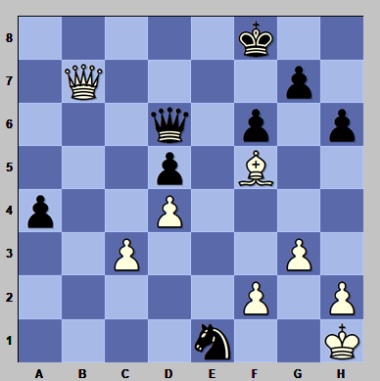
31…Qe7! seems to hold but after 31…Nf3? 32.Bg6! the black king was suddenly caught in a mating net. The time Ding took to play 32…Ng5 33.Qc8+ and resign gave Carlsen a chance to savor the moment! “There is no faking it at that point! That was just pure joy,” said Magnus.
That meant the scores were level as the players went into the final rapid game, where Ding Liren had the white pieces. The stakes were incredibly high, and both players would ultimately face the choice of whether to gamble on winning the game or bail out into a draw that would take the match to a blitz playoff.
At first, things seemed to go well for Ding Liren, and he had some amazing options open to him (18.d5! exd5 19.Bxe4 dxe4 20.Nxd7 Rxd7 21.Bf6!! pointed out by Romain Edouard in Twitter). Instead in the game, Ding began to lose the thread with 18.Ba3!? and soon it was Magnus who was taking over. Events reached fever pitch after moves were repeated to get to 28.Rf3:
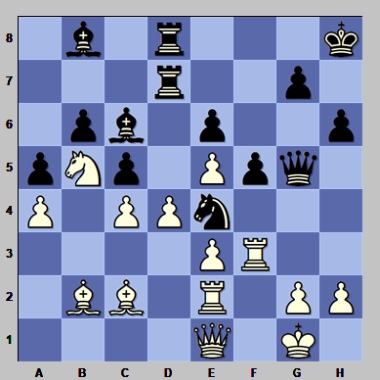
Peter Svidler had immediately spotted that Black could win the exchange with Nc3, unleashing the c6-bishop to attack the rook on f3. It seems Magnus had spotted it too, but he was reluctant to pull the trigger. Ding met 28…Nc3 with 29.d5! Nxe2 30.Qxe2 and suddenly it was unclear if the Chinese star hadn’t trapped the World Champion.
White was soon better, then equal, and the logical end to the game would probably have been a repetition of moves… but this time it was Ding who rejected it!
The last big twist in the game, and match, came when the white knight reaching f4 forced Magnus to sacrifice a piece with 40…Bxd6!
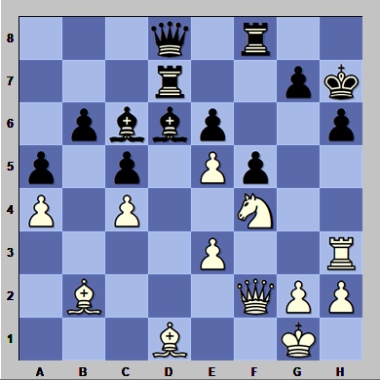
Magnus didn’t pretend to have worked out all the details: “What can I say? I didn’t really calculate too much here – I just felt like I needed to break out, and that was it.” He was very happy to see 41.Nxe6?!, when he was sure he was safe, while after 41.exd6 it seems White would still have been better. The game ended abruptly a few moves later, with Magnus finding the winning blow at the second opportunity:
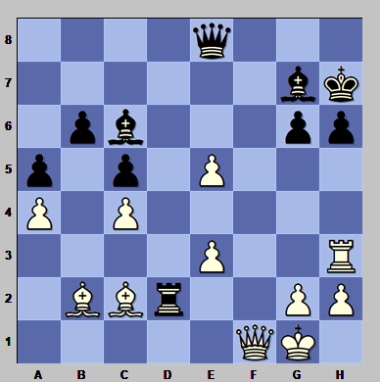
The white bishops and the g2-point are all targetted, but Magnus pointed out he could still have blundered, e.g. 46.Bxg6+ Qxg6 47.Rg3 Qc2?? 48.Rxg7+! Kxg7 49.e6+! and there’s no more than a draw by perpetual check. Ding Liren didn’t test that, but let his time run out.
Magnus Carlsen had therefore qualified for the final of the tournament with his name on it. He paid tribute to his opponent: “It should be said “well done” to Ding as well. It must be an unpleasant feeling, but he already congratulated me on winning, graciously, and I hope he will be back for more events like this. As you all could see, I’m finding it extremely tough to play him and I think so will other people who try to stand in his way.”
Text: Colin McGourty, chess24.com
Photo: chess24.com







